
Esports, short for electronic sports, is a form of competition using video games. Esports often takes the form of organized, multiplayer video game competitions, particularly between professional players, played individually or as teams.
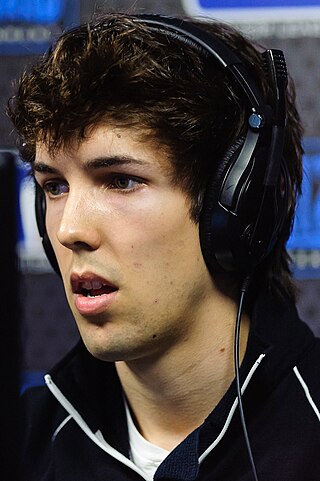
Manuel Schenkhuizen, better known as Grubby, is a Dutch real-time strategy gamer and former professional esports player. He competed in the RTS games Warcraft III (WC3), Warcraft III: The Frozen Throne and Starcraft II. Grubby is one of the most successful WC3 players of all time, as an Orc player, having won more than 38 LAN tournaments, of which six were World Championships. His command over the Horde placed him early enough among the elite of the WC3 players, while his clash with Jang "Spirit Moon" Jae-ho rewarded him with a legendary status among the fans of the game. Grubby is known for being part of some of the most successful WC3 teams in history, namely the British 4Kings. Later teams include the Danish MeetYourMakers and the North American Evil Geniuses. Grubby is widely regarded as one of the greatest Orc players of all time. Grubby is now a popular full-time streamer on Twitch.

OGN is a South Korean pay television channel that specialized in broadcasting video game-related content and esports matches, particularly StarCraft, Starcraft II, League of Legends, and Overwatch. OGN ran high level professional tournaments for 20 years; its premier competition included the Ongamenet Starleague (OSL), Proleague, League of Legends Champions Korea, and Overwatch APEX. It was previously a subsidiary of On-Media, the parent company of several other cable channels. After a corporate merger in 2010, it became a part of CJ ENM E&M Division. Most recently, League of Legends statistics website, OP.GG, which also sponsored LCK since 2022, has acquired OGN from CJ ENM following the shutdown of the linear TV network during the COVID-19 pandemic.

Lim Yo-hwan, known online as SlayerS_'BoxeR', is a former professional player of the real-time strategy computer game StarCraft. He is often referred to as The Terran Emperor, or simply The Emperor, and is widely considered to be one of the most successful players of the genre as well as a pop culture icon.

Major League Gaming Corp. (MLG) is a professional esports organization. MLG is headquartered in New York City, New York and was founded in 2002 by Sundance DiGiovanni and Mike Sepso. MLG has held official video game tournaments throughout the United States and Canada. The Boost Mobile MLG Pro Circuit was a television broadcast of Halo 2 MLG tournaments in 2006 and 2007, ESPN.com, and other broadband sites. The company has also been involved in television production, and game development. MLG's aim is to elevate computer and console game tournaments to viable competitive and spectator events.

Jang Jae-ho is a South Korean professional gamer of the popular Blizzard real-time strategy games Warcraft III and StarCraft II. He is seen by many as the best Night Elf player in the world. Jang Jae-ho is a five time world champion and has won three televised national Korean WarCraft III Championships as well as four seasons of MBCGame's World War. He is particularly known for his excellent micromanagement and innovative strategies. He is often seen using strategies that later set the benchmark for many Night Elf players and was nicknamed the "5th Race" by Gametv.com. He has played and won more televised WarCraft III games than any other Warcraft III players. Jang Jae-ho is featured in the documentary film Beyond the Game. Moon transitioned to StarCraft II and was without a team for a while, before retiring from professional gaming in order to fulfill South Korean military service requirements. After completing his military service, Moon returned to Warcraft 3 and is currently active.

The real time strategy (RTS) computer game StarCraft had an active professional competition circuit, particularly in South Korea. The two major game channels in South Korea, Ongamenet and MBCGame, each ran a Starleague, viewed by millions of fans.

Ma Jae-yoon, known by the pseudonym sAviOr, and dubbed "The Maestro", is a former professional South Korean e-sports gamer of the real-time strategy game StarCraft. He played the Zerg race and was one of the most successful and popular players of all time. Savior was one of several players implicated in the 2010 match fixing scandal, and as a result he was banned from KeSPA-run competition for life. After retiring as a pro-gamer, sAviOr began streaming on AfreecaTV, but AfreecaTV made the decision to ban several players implicated in match-fixing offenses from the platform, including sAviOr. Ma Jae-yoon was a member of CJ Entus, a professional StarCraft: Brood War e-sports team sponsored by CJ CGV, an entertainment subsidiary of the CJ Corporation.

Lee Young-ho is a South Korean StarCraft: Brood War and StarCraft II player who played Terran for the Korean pro-gaming team KT Rolster under the alias By.FlaSh or simply Flash. He made his debut as a StarCraft: Brood War player in 2007 and retired on December 19, 2015. Lee began playing StarCraft II competitively in 2011, until his retirement in December 2015. He subsequently returned to playing Starcraft: Brood War, and started his personal broadcast in February 2016 on the AfreecaTV personal broadcasting platform. Since returning to Brood War, Lee has won first place in Seasons 2, 3, 4, and 8 of the Afreeca Starleague. As of 2020, he is still broadcasting personal broadcasts. He is, along with BoxeR, NaDa, Iloveoov, and SAviOr, regarded as the fifth, final, and greatest of the Bonjwas, a title for players who dominated the Korean Brood War scene over long periods of time. He is considered to be the greatest StarCraft: Brood War player of all-time.
StarCraft II is a military science fiction video game created by Blizzard Entertainment as a sequel to the successful StarCraft video game released in 1998. Set in a fictional future, the game centers on a galactic struggle for dominance among the various fictional races of StarCraft.

Global StarCraft II League (GSL) is a StarCraft II tournament held in South Korea from 2010 to the present. It has been hosted by afreecaTV since 2016; GOMeXp hosted it from 2010–2015. Blizzard Entertainment was involved in co-producing and co-funding it for much of its history, although their involvement reduced in later years. For the first two years of the tournament, it featured two leagues, Code S (major) and Code A (minor); afterward it ran as a single combined tournament.

The Global StarCraft II Team League (GSTL) was a StarCraft II tournament series hosted by GomTV and Blizzard Entertainment in South Korea. It ran from 2011 to 2013 as a team event parallel to the individual Global StarCraft II League, broadcast on Thursday and Friday, to not conflict with the GSL's Monday to Wednesday broadcast. Following competition with the KeSPA-run StarCraft II Proleague, which had fully transitioned to Starcraft II in 2013, the GSTL folded, having played its last grand finals event in November 2013.
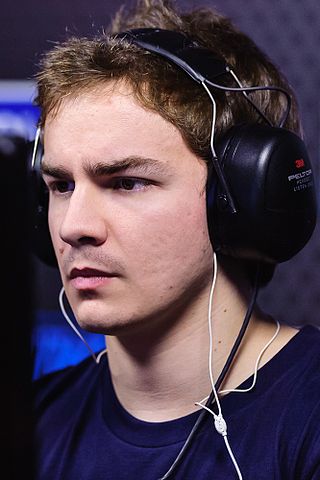
Chris Loranger, better known name HuK, is a former professional Starcraft II player and former president of gaming for the Boston Uprising of the Overwatch League.
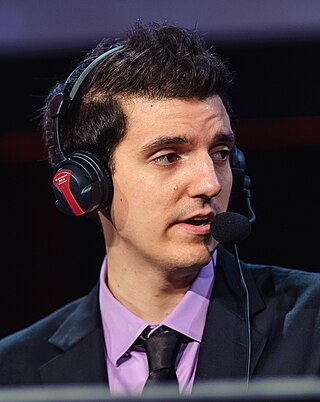
Daniel Ray Stemkoski, better known by his nickname Artosis, is an American professional esports commentator and Twitch streamer. Stemkoski moved to Seoul, South Korea to commentate competitive Starcraft games in English. Together with Nick "Tasteless" Plott, he provides commentary for AfreecaTV StarCraft League games.

Nicolas Plott, known by his alias Tasteless, is an American esports commentator. He moved to Seoul, Korea in 2007 to give commentary to e-sports competitions. He has provided commentary for multiple Starcraft and Starcraft 2 tournaments. Together with Dan "Artosis" Stemkoski, he currently provides commentary for Global StarCraft II League and AfreecaTV StarLeague games.
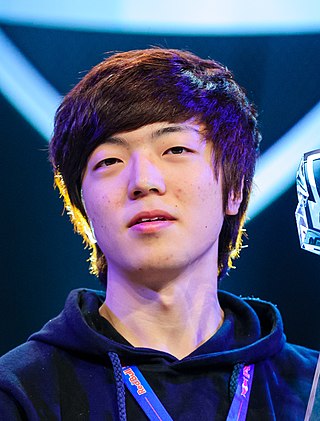
Lee Seung-Hyun, better known as Life, is a South Korean former professional StarCraft II player. He began his professional career in 2011 with Team Zenex, which later merged with StarTale. He subsequently represented teams such as KT Rolster and briefly, Afreeca Freecs. Throughout his career, Life distinguished himself as one of the most accomplished StarCraft II players in the history of the game. He secured numerous premier tournament victories, including a World Championship Series title in 2014, two Global StarCraft II League (GSL) titles, a GSL Blizzard Cup title, two Major League Gaming events, two DreamHack tournaments, and one Intel Extreme Masters competition.
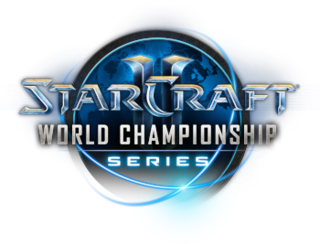
The StarCraft II World Championship Series (WCS) was a StarCraft II professional tournament series organized and sanctioned by Blizzard Entertainment that ran from 2012 to 2019. For all but its first year of operation, it was the highest tier of professional StarCraft II competition. Its longest-running iteration featured two regions, World Championship Series Korea and World Championship Series Circuit, with World Championship Series Global events featuring players from both regions. Grand finals were held annually at BlizzCon in Anaheim, California, except for the first year of competition, when the finals were held in Shanghai, China. WCS Circuit events were streamed on Twitch while WCS Korea events were available on Twitch, YouTube, and afreecaTV.
StarCraft Proleague, also known as StarCraft II Proleague or Proleague for short, was the longest running StarCraft league in the world and the most prestigious team league. Hosted by the Korean eSports Association (KeSPA), the league was played offline in South Korea. Proleague began in 2003 with the game StarCraft: Brood War before switching over to StarCraft II in 2012 and then discontinued in 2016. It was broadcast by SPOTVGames prior to being discontinued.
Professional StarCraft II competition features professional gamers competing in Blizzard Entertainment's real-time strategy game StarCraft II. Professional play began following the game's initial release in 2010, as the game was the sequel to StarCraft, considered one of the first esports and the foundation of South Korea's interest and success in competitive gaming. Between 2016 and 2019, competition was centered around the Global StarCraft II League in Korea and the World Championship Series Circuit everywhere else, with all Blizzard-sanctioned events being under the StarCraft II World Championship Series (WCS) banner. Since 2020, Blizzard changed the format of WCS by entering into a three-year partnership with esports organizers ESL and DreamHack.
















